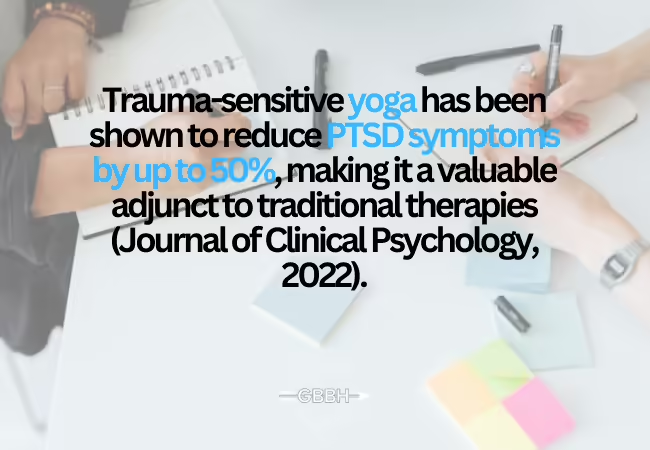Trauma can leave deep scars, not only emotionally but physically and mentally as well. While traditional therapeutic methods like CBT Therapy and DBT Therapy are invaluable in addressing these wounds, holistic practices such as yoga are increasingly being recognized for their profound ability to complement mental health treatments. Integrating yoga into a trauma recovery plan can help individuals reconnect with their bodies, process emotions, and regain balance and peace.
What is Trauma?
Trauma is the emotional response to a deeply distressing or disturbing event. It can manifest in various ways, including anxiety, depression, and post-traumatic stress disorder (PTSD). While clinical interventions like those offered by Mental Health Treatment Programs in Boston provide structured support, the mind-body connection that yoga fosters can play a vital role in recovery.
The Science Behind Yoga and Trauma
Research has highlighted the physiological impact of yoga on the brain and nervous system. Yoga activates the parasympathetic nervous system, which promotes relaxation and reduces the “fight or flight” response often triggered in trauma survivors. Studies also show that yoga can increase levels of GABA (gamma-aminobutyric acid), a neurotransmitter linked to improved mood and reduced anxiety.
At Greater Boston Behavioral Health, located in Needham, MA, just 30 minutes west of downtown Boston, we recognize the transformative potential of integrating yoga into our Mental Health Therapy Programs. Our goal is to provide clients with a comprehensive toolkit for recovery, blending evidence-based treatments with holistic practices like yoga.
Yoga as a Complement to Traditional Therapy
While yoga offers numerous benefits, it works best when combined with professional therapeutic approaches such as CBT Therapy (Cognitive Behavioral Therapy) and DBT Therapy (Dialectical Behavior Therapy). These therapies help individuals challenge negative thought patterns and develop coping mechanisms, while yoga addresses the physical manifestations of trauma. Together, they create a well-rounded recovery strategy.
Yoga Practices for Trauma Recovery
- Breathwork (Pranayama): Controlled breathing techniques calm the mind and body, making them particularly effective for individuals struggling with anxiety or panic attacks.
- Gentle Poses: Restorative yoga poses such as Child’s Pose and Savasana can help release tension and promote relaxation.
- Mindfulness Meditation: Incorporating meditation into yoga practice allows individuals to observe their thoughts without judgment, fostering self-compassion.
- Trauma-Informed Yoga: This specialized form of yoga is tailored to trauma survivors, focusing on creating a safe and empowering environment.
Our team at Greater Boston Behavioral Health is dedicated to providing a supportive and healing space where individuals can explore the benefits of yoga alongside traditional therapies. Whether you’re seeking help for trauma, anxiety, or depression, we’re here to guide you on your path to recovery.
How Yoga Supports Trauma Recovery
Yoga offers a unique combination of physical movement, breathwork, and mindfulness that directly addresses the physical and emotional effects of trauma. When practiced regularly, yoga helps individuals regulate their nervous system, release stored tension, and cultivate a sense of safety and empowerment.
1. Reconnecting with the Body
Trauma often causes individuals to feel disconnected from their bodies, leading to a sense of alienation or lack of control. Yoga’s gentle movements and poses encourage individuals to reconnect with their bodies in a safe and nonjudgmental way.
- Body Awareness: Practicing yoga helps individuals become more attuned to physical sensations, allowing them to recognize and address areas of tension.
- Grounding Techniques: Standing poses and balance exercises foster a sense of stability and control.
2. Regulating the Nervous System
Trauma dysregulates the nervous system, keeping individuals in a state of hypervigilance or emotional numbness. Yoga activates the parasympathetic nervous system (rest-and-digest mode), helping to calm the body and mind.
- Breathing Exercises (Pranayama): Controlled breathing techniques reduce stress and activate relaxation responses.
- Mindfulness Practices: Yoga teaches individuals to stay present, reducing the impact of intrusive thoughts and triggers.
3. Releasing Stored Trauma
Trauma can manifest as physical tension, particularly in areas like the hips, chest, and shoulders. Yoga poses specifically target these areas to release stored emotions and stress.
- Hip-Opening Poses: Postures like Pigeon Pose and Butterfly Pose release tension often associated with emotional suppression.
- Heart-Opening Poses: Backbends like Cobra Pose or Bridge Pose help alleviate feelings of vulnerability and fear.
4. Promoting Emotional Regulation
Yoga cultivates mindfulness and self-awareness, which are critical for managing intense emotions. These skills align closely with the principles of DBT Therapy and CBT Therapy.
- Mindful Observation: Encourages individuals to observe their emotions without judgment or reactivity.
- Self-Compassion: Yoga fosters acceptance of one’s feelings and experiences, reducing self-criticism.
Integrating Yoga with Traditional Therapies
Yoga complements traditional therapies, creating a more comprehensive treatment plan for trauma recovery. When combined with evidence-based approaches, yoga enhances therapeutic outcomes and provides additional tools for managing symptoms.
1. Synergy with CBT Therapy
- Cognitive Behavioral Therapy focuses on identifying and changing negative thought patterns. Yoga reinforces these efforts by promoting self-awareness and mindfulness, enabling individuals to notice triggers and respond thoughtfully.
- Yoga can prepare individuals for therapy sessions by reducing anxiety and improving focus.
2. Enhancing DBT Therapy
- Dialectical Behavior Therapy emphasizes emotional regulation and distress tolerance. Yoga serves as a practical tool for managing stress and applying DBT techniques in real-life situations.
- Breathing exercises and mindfulness practices taught in yoga align seamlessly with DBT skills.
Benefits of Yoga for Trauma Recovery
Yoga offers a wide range of benefits that address the physical, emotional, and cognitive aspects of trauma.
1. Physical Benefits
- Improved Flexibility and Strength: Yoga builds physical resilience, which supports emotional resilience.
- Tension Release: Regular practice alleviates chronic pain and muscle tension.
- Better Sleep: Restorative yoga practices promote relaxation and improve sleep quality.
2. Emotional Benefits
- Reduced Anxiety and Depression: Yoga lowers cortisol levels, reducing stress and enhancing mood.
- Increased Emotional Awareness: Practicing mindfulness during yoga fosters a deeper understanding of one’s emotions.
- Empowerment: Reconnecting with the body instills a sense of control and self-confidence.
3. Cognitive Benefits
- Enhanced Focus and Clarity: Yoga improves concentration and reduces intrusive thoughts.
- Positive Self-Perception: The practice encourages self-compassion and a more balanced perspective on one’s experiences.
Types of Yoga for Trauma Recovery
Not all yoga styles are suitable for trauma recovery. It’s essential to choose practices that prioritize safety, mindfulness, and empowerment.
1. Trauma-Sensitive Yoga
- Specifically designed for trauma survivors, emphasizing safety, choice, and empowerment.
- Instructors are trained to avoid triggering language or poses.
2. Restorative Yoga
- Focuses on deep relaxation through passive, supported poses.
- Ideal for reducing stress and promoting a sense of calm.
3. Hatha Yoga
- Combines gentle movements with breathing techniques, making it accessible for beginners.
4. Mindful Yoga
- Integrates mindfulness meditation with physical poses to enhance awareness and emotional regulation.
Incorporating Yoga into a Trauma Recovery Plan
For individuals in Boston, integrating yoga into Mental Health Treatment Programs at a Mental Health Treatment Center in Boston provides a well-rounded approach to trauma recovery. Here’s how to incorporate yoga effectively:
1. Work with Trauma-Informed Instructors
- Seek out yoga classes or instructors who specialize in trauma-sensitive practices.
- Ensure the environment feels safe and supportive.
2. Align Yoga with Therapy Goals
- Collaborate with therapists to integrate yoga into your overall treatment plan.
- Use yoga as a tool to practice mindfulness and emotional regulation outside of therapy sessions.
3. Start Small and Build Consistency
- Begin with short, gentle sessions and gradually increase the duration and intensity.
- Practice regularly to reinforce the benefits and build a routine.
Why Choose Greater Boston Behavioral Health?
Located in the heart of Needham, MA, our Mental Health Treatment Center in Boston offers a range of innovative programs designed to address the unique needs of each client. We understand that the road to recovery can feel daunting, but we believe in the resilience of the human spirit. Our behavioral health programs provide:
- Comprehensive mental health counseling.
- Access to holistic practices like yoga and mindfulness.
- Individualized care tailored to your unique journey.
If you’re in the Boston area and seeking a compassionate and effective approach to trauma recovery, consider joining us at Greater Boston Behavioral Health. Our programs are designed to empower you with the tools, resources, and support needed for lasting healing. Whether through evidence-based therapies like CBT Therapy or holistic practices such as yoga, we are committed to your well-being.
Final Thoughts
Yoga offers a holistic, empowering approach to trauma recovery, addressing the mind, body, and emotions simultaneously. When combined with evidence-based therapies like CBT Therapy and DBT Therapy, yoga can transform the recovery process, fostering resilience, self-awareness, and a sense of control.
If you’re ready to explore the healing power of yoga as part of your trauma recovery journey, Greater Boston Behavioral Health is here to help. Contact us today at (888)278-0716 to learn more about our programs and begin your path to healing and empowerment.
FAQs on Healing Power of Yoga
How does yoga help with trauma recovery?
Yoga helps regulate the nervous system, release stored tension, and promote mindfulness, making it a powerful tool for addressing the physical and emotional effects of trauma.
Can yoga be combined with traditional therapies for trauma?
Yes, yoga complements therapies like CBT Therapy and DBT Therapy by enhancing emotional regulation, mindfulness, and stress management.
What are the best types of yoga for trauma recovery?
- Trauma-Sensitive Yoga: Specifically designed for trauma survivors.
- Restorative Yoga: Focuses on relaxation and stress relief.
- Hatha Yoga: Gentle movements suitable for beginners.
Can yoga help with anxiety and depression caused by trauma?
Yes, yoga reduces cortisol levels, improves emotional awareness, and fosters relaxation, making it effective for managing anxiety and depression.
What are the physical benefits of yoga in trauma recovery?
Yoga relieves muscle tension, improves flexibility and posture, enhances sleep quality, and reduces chronic pain linked to trauma.
Is yoga safe for trauma survivors?
When practiced with a trauma-informed instructor, yoga is safe and empowering for trauma survivors, focusing on choice and emotional safety.
How often should I practice yoga for trauma recovery?
Starting with 2-3 sessions per week is beneficial. Gradually build consistency to experience lasting benefits.
Does Greater Boston Behavioral Health offer yoga for trauma recovery?
Yes, we integrate yoga into our Mental Health Treatment Programs, combining it with evidence-based therapies like CBT and DBT for comprehensive trauma care.


